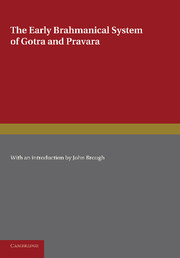 The Early Brahmanical System of Gotra and Pravara
The Early Brahmanical System of Gotra and Pravara Book contents
- Frontmatter
- Contents
- Abbreviations
- Sigla
- Preface
- INTRODUCTION
- GOTRA-PRAVARA-MANJARī OF PURUŞOTTAMA-PAŅḌITA
- INTRODUCTION AND SUMMARY OF CONTENTS
- CHAPTER I General Rules
- CHAPTER II The Bhṛgus
- CHAPTER III The Angirases
- CHAPTER IV The Atris
- CHAPTER V The Viśvāmitras
- CHAPTER VI The Kaśyapas
- CHAPTER VII The VasiŞṭhas
- CHAPTER VIII The Agastis
- CHAPTER IX Kśatriyas and Vaiśyas
- CHAPTER X Ignorance as to pravara, etc
- CHAPTER XI The Mānava-pravara
- CHAPTER XII Conclusion
- Index
CHAPTER IX - Kśatriyas and Vaiśyas
from GOTRA-PRAVARA-MANJARī OF PURUŞOTTAMA-PAŅḌITA
Published online by Cambridge University Press: 05 June 2016
- Frontmatter
- Contents
- Abbreviations
- Sigla
- Preface
- INTRODUCTION
- GOTRA-PRAVARA-MANJARī OF PURUŞOTTAMA-PAŅḌITA
- INTRODUCTION AND SUMMARY OF CONTENTS
- CHAPTER I General Rules
- CHAPTER II The Bhṛgus
- CHAPTER III The Angirases
- CHAPTER IV The Atris
- CHAPTER V The Viśvāmitras
- CHAPTER VI The Kaśyapas
- CHAPTER VII The VasiŞṭhas
- CHAPTER VIII The Agastis
- CHAPTER IX Kśatriyas and Vaiśyas
- CHAPTER X Ignorance as to pravara, etc
- CHAPTER XI The Mānava-pravara
- CHAPTER XII Conclusion
- Index
Summary
I SHALL now tell in order the rules of pravara and non-marriage in the case of Ksatriyas and Vaisyas, and their dependance on the pravara of their purohitas, since they stand (as it were) in the relationship of children to their purohitas.
Baudhdyana
Ksatriyas have a three-ra (pravara), ‘Manava, Aida, Paururavasa’ for the Hotr, ‘like Pururavas, Ida, Manu’, for the Adhvaryu. Vaisyas have a three-ra pravara,‘Bhalandana, Vatsapra, Mankila’ for the Hotr,‘like Mankila, Vatsapri, Bhalandana’ for the Adhvaryu.
Apastamba
Next, of Ksatriyas. If they recite their own, they have the one pravara, ‘Manava, Aida, Paururavasa’, etc. Those who do not have hymn-composers should make the recitation with their purohita's pravara; those who have hymncomposers should do without their purohita's pravara. (But the correct view is that these also) should use their purohita's pravara, because of the logical argument. Vaisyas have a one-ra pravara,‘Vatsapra’ for the Hotr,‘like Vatsapri’ for the Adhvaryu.
Kdtydyana and Laugdksi
[Kings have their purohita's pravara; with this too the pravara of Vaisyas is explained. If he should recite with ra-names he should say: ‘Manava, Aila, Paururavasa.’]
Asvaldyana
Kings have their purohita's pravara; if they should make the pravararecitation with rsis, ‘Manava, Aila, Paururavasa’.
Purusottama comments:
‘With rsis’ (sdrsam) means ‘with .ra-names’ (sahdrseyam). (Here follows Purusottama's comment on the Apastamba rule):
Here, there are two kinds of Ksatriyas: some have hymn-composers, and some do not. Those who have should recite their own (pravara), those who do not, the pravara of their purohita; having laid down these two prima facie views, he gives as the correct view (siddhanta) that all Ksatriyas should recite only the pravara of their purohitas—‘because of the logical argument’. Now what logical argument is meant? First, all Ksatriyas have purohitas, and without them they have no admittance to sacrificial rites, as is seen from the etymology of purohita, ‘being placed in front of him, he leads him in all matters’ and on the view that all Ksatriyas should recite their own pravara, the result would be that there could be no intermarriage among them, since they would all have the same pravara.
- Type
- Chapter
- Information
- The Early Brahmanical System of Gotra and PravaraA Translation of the Gotra-Pravara-Manjari of Purusottama-Pandita, pp. 195 - 196Publisher: Cambridge University PressPrint publication year: 2013


